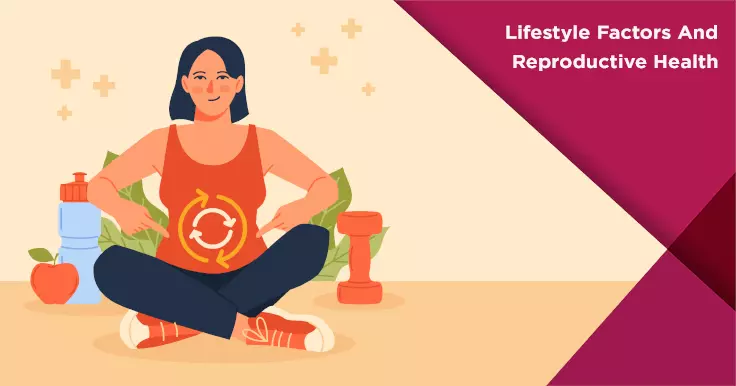Age: you just might be able to turn back the clock
Unfortunately as men and women age, both the sperm and the eggs are less able to form an embryo that can implant and form a normal offspring. A poor diet and poor lifestyle habits can worsen this process, or even cause poor egg and sperm quality in younger individuals.
Diet and supplements: modifications can be helpful
The testicles and ovaries need a good blood supply, which brings more nutrients, oxygen and hormones so that their functions can be optimised. The antioxidant capacity of the semen and of the fluid and cells surrounding the egg decreases with age and is lower in individuals with poor sperm and egg quality. Potent oxidants increase with age and accumulate from eating foods cooked at a high heat such as with grilling and barbecuing and with higher blood sugar levels, as with obesity or excessive sugar consumption. In the male, oxidation products correlate with poor semen parameters, particularly motility, and also correlate with fragmentation of the sperm DNA. In the female, oxidation products correlate with less viability of the granulosa cells which surround and nourish the egg. A diet rich in antioxidants such as berries and a healthy balanced diet would be useful changes prior to planning conception.
Weight: a BMI in the normal range is best
Excess body weight has major effects on ovulation but relatively minor effects on sperm quality. Weight also decreases the chance of pregnancy and increases the chance of miscarriage even if a woman is ovulating. Excess weight is a factor that should be attended to when you first start to attempt conception. If you do require fertility treatments your chance of success will be higher. Your pregnancy will be less complicated and your health will be better for many years to come.
Exercise: don't overdo it
Exercise has only positive effects for the male, but in one study from Harvard, more than 3 hours of aerobic exercise per week for the female was associated with a reduced pregnancy rate with IVF. Until this is clarified by further studies we suggest only the standard 30 minutes of moderate exercise (such as a brisk walk) most days a week that is advised for good general health.
The environment: be careful
There has been relatively little study of the effects of the environment on fertility. It has long been known that lead, cadmium and some pesticides adversely affect sperm quality, and a recent study suggested that having a cell phone in a front pants pocket transmitting to an earpiece may influence sperm quality through cell phone radiation. A recent study correlated the levels of bisphenol-A, which is an endocrine disruptor that leaches out of some plastic water bottles with reduced ovarian response to stimulation.
Smoking: a definite no-no
Smoking has major adverse effects on both sperm and egg quality. With female smoking, natural fertility is decreased and the chance of successful pregnancy with IVF is decreased by 50%. Although one would assume that the effects would be lesser in degree, second-hand smoke was found to have a similar effect on the outcome of IVF compared with smoking. The effect is not only on egg quality. Recipients of egg donation who smoke also have a significantly lower pregnancy rate. Female smoking also increases miscarriage. In the male, smoking increases sperm DNA fragmentation, which can increase risk of miscarriage and may help to explain why male smoking decreases IVF success by a third, even when a sperm is directly inserted into each egg.
Alcohol: best be avoided
Alcohol also reduces fertility in both partners and alcohol intake by the male may increase miscarriage. In one study small amounts of caffeine and alcohol appeared to have additive or even synergistic effects in the female. As with most adverse life choices, the effects appear to be greater with the more advanced procedure of IVF. With the exception of couples just beginning to attempt conception, avoiding alcohol will give them the greatest chance of being successful.
Caffeine: also avoid it
Caffeine intake does not appear to affect male fertility unless it is excessive (over 3 cups of caffeinated coffee per day). However, female fertility is influenced to a greater degree, with moderate amounts reducing fertility and any significant intake reducing the success with IVF. Caffeine should not be used by pregnant women as it has been associated with miscarriage.
Sex: don't avoid it
Frequency of intercourse certainly is very important in attempting to conceive. The recommended frequency is every one to two days around the expected time of ovulation. Frequent ejaculation may also be helpful before IVF or ICSI by decreasing sperm DNA fragmentation. More frequent erections may also decrease the later development of erectile dysfunction (ED).
Stress and relaxation: try to reduce stress
Finally, any discussion of life choices and fertility would be incomplete without discussing the effects of anxiety, stress, and depression. Various studies have shown a reduced success rate in achieving pregnancy in women experiencing these symptoms, and an intensive stress reduction program has been shown in controlled studies to reduce the time to achieve a pregnancy in couples just beginning to attempt conception and to increase the pregnancy rate with IVF.
The Bottom Line - you can help yourselves be successful!
It should be apparent from the above discussion that there are many lifestyle choices a couple can modify to increase their chances of being successful. Ideally these should be altered when beginning to try to conceive, but all of these factors become progressively more important as the fertility treatments become more involved. Also keep in mind the changes you are able to achieve will improve your general health for many years to come.
 Infertility Counselling
Infertility Counselling Female Infertility Treatment
Female Infertility Treatment Andrology Treatment
Andrology Treatment Fertility Enhancing Surgeries - Female
Fertility Enhancing Surgeries - Female Fertility Enhancing Surgeries - Male
Fertility Enhancing Surgeries - Male Endoscopy Treatment
Endoscopy Treatment IUI Treatment
IUI Treatment IVF Treatment
IVF Treatment ICSI Treatment
ICSI Treatment Advanced IVF Solutions
Advanced IVF Solutions Embryology
Embryology Vitrification Egg, Embryo, Sperm Freezing
Vitrification Egg, Embryo, Sperm Freezing Preimplantation Genetic Testing (PGT)
Preimplantation Genetic Testing (PGT) Donation Program Embryo / Egg / Sperm
Donation Program Embryo / Egg / Sperm Self-cycleTM IVF
Self-cycleTM IVF

 Self-cycleTM IVF
Self-cycleTM IVF









